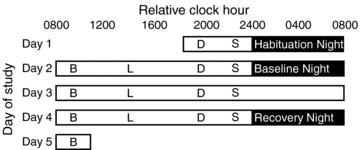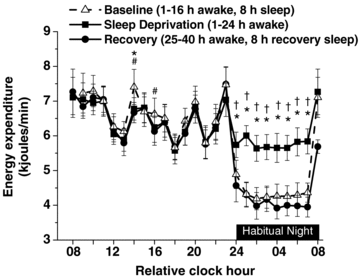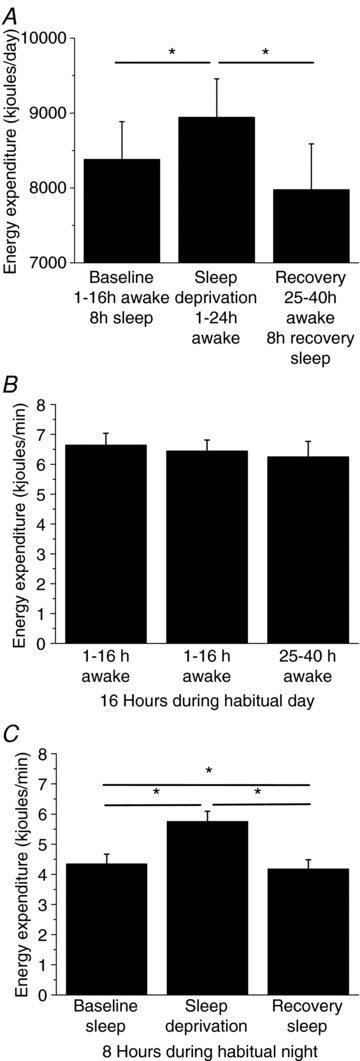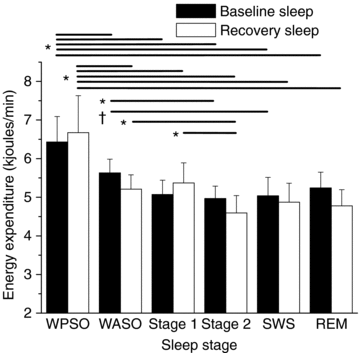Energy expenditure during sleep, sleep deprivation and sleep following sleep deprivation in adult humans
- PMID: 21059762
- PMCID: PMC3039272
- DOI: 10.1113/jphysiol.2010.197517
Energy expenditure during sleep, sleep deprivation and sleep following sleep deprivation in adult humans
Abstract
Sleep has been proposed to be a physiological adaptation to conserve energy, but little research has examined this proposed function of sleep in humans. We quantified effects of sleep, sleep deprivation and recovery sleep on whole-body total daily energy expenditure (EE) and on EE during the habitual day and nighttime. We also determined effects of sleep stage during baseline and recovery sleep on EE. Seven healthy participants aged 22 ± 5 years (mean ± s.d.) maintained ∼8 h per night sleep schedules for 1 week before the study and consumed a weight-maintenance diet for 3 days prior to and during the laboratory protocol. Following a habituation night, subjects lived in a whole-room indirect calorimeter for 3 days. The first 24 h served as baseline – 16 h wakefulness, 8 h scheduled sleep – and this was followed by 40 h sleep deprivation and 8 h scheduled recovery sleep. Findings show that, compared to baseline, 24 h EE was significantly increased by ∼7% during the first 24 h of sleep deprivation and was significantly decreased by ∼5% during recovery, which included hours awake 25-40 and 8 h recovery sleep. During the night time, EE was significantly increased by ∼32% on the sleep deprivation night and significantly decreased by ∼4% during recovery sleep compared to baseline. Small differences in EE were observed among sleep stages, but wakefulness during the sleep episode was associated with increased energy expenditure. These findings provide support for the hypothesis that sleep conserves energy and that sleep deprivation increases total daily EE in humans.
Figures




Similar articles
-
Experimental sleep curtailment causes wake-dependent increases in 24-h energy expenditure as measured by whole-room indirect calorimetry.Am J Clin Nutr. 2013 Dec;98(6):1433-9. doi: 10.3945/ajcn.113.069427. Epub 2013 Oct 2. Am J Clin Nutr. 2013. PMID: 24088722 Free PMC article. Clinical Trial.
-
Acute sleep deprivation reduces energy expenditure in healthy men.Am J Clin Nutr. 2011 Jun;93(6):1229-36. doi: 10.3945/ajcn.110.006460. Epub 2011 Apr 6. Am J Clin Nutr. 2011. PMID: 21471283 Clinical Trial.
-
Impact of circadian misalignment on energy metabolism during simulated nightshift work.Proc Natl Acad Sci U S A. 2014 Dec 2;111(48):17302-7. doi: 10.1073/pnas.1412021111. Epub 2014 Nov 17. Proc Natl Acad Sci U S A. 2014. PMID: 25404342 Free PMC article.
-
Sleep deprivation and energy metabolism: to sleep, perchance to eat?Curr Opin Endocrinol Diabetes Obes. 2007 Oct;14(5):374-81. doi: 10.1097/MED.0b013e3282be9093. Curr Opin Endocrinol Diabetes Obes. 2007. PMID: 17940466 Review.
-
Partial sleep deprivation and energy balance in adults: an emerging issue for consideration by dietetics practitioners.J Acad Nutr Diet. 2012 Nov;112(11):1785-97. doi: 10.1016/j.jand.2012.07.032. J Acad Nutr Diet. 2012. PMID: 23102177 Review.
Cited by
-
Signals of energy availability in sleep: consequences of a fat-based metabolism.Front Nutr. 2024 Aug 29;11:1397185. doi: 10.3389/fnut.2024.1397185. eCollection 2024. Front Nutr. 2024. PMID: 39267859 Free PMC article. Review.
-
Prolonged Sleep Deprivation Induces a Reprogramming of Circadian Rhythmicity with the Hepatic Metabolic Transcriptomic Profile.Biology (Basel). 2024 Jul 17;13(7):532. doi: 10.3390/biology13070532. Biology (Basel). 2024. PMID: 39056724 Free PMC article.
-
Assessment of Impact of Dietary Patterns on Obstructive Sleep Apnea Patients.Sleep Sci. 2024 Mar 26;17(1):e82-e89. doi: 10.1055/s-0043-1776745. eCollection 2024 Mar. Sleep Sci. 2024. PMID: 38545237 Free PMC article.
-
Enhanced conductive body heat loss during sleep increases slow-wave sleep and calms the heart.Sci Rep. 2024 Feb 26;14(1):4669. doi: 10.1038/s41598-024-53839-x. Sci Rep. 2024. PMID: 38409133 Free PMC article.
-
Deep rest: An integrative model of how contemplative practices combat stress and enhance the body's restorative capacity.Psychol Rev. 2024 Jan;131(1):247-270. doi: 10.1037/rev0000453. Epub 2023 Dec 25. Psychol Rev. 2024. PMID: 38147050 Free PMC article.
References
-
- Benington JH, Heller HC. Restoration of brain energy metabolism as the function of sleep. Prog Neurobiol. 1995;45:347–360. - PubMed
-
- Berger RJ, Phillips NH. Energy conservation and sleep. Behav Brain Res. 1995;69:65–73. - PubMed
-
- Bergmann BM, Gilliland MA, Feng PF, Russell DR, Shaw P, Wright M, Rechtschaffen A, Alverdy JC. Are physiological effects of sleep deprivation in the rat mediated by bacterial invasion? Sleep. 1996;19:554–562. - PubMed
-
- Bonnet MH, Berry RB, Arand DL. Metabolism during normal, fragmented, and recovery sleep. J Appl Physiol. 1991;71:1112–1118. - PubMed
-
- Brebbia DR, Altshuler KZ. Oxygen consumption rate and electroencephalographic stage of sleep. Science. 1965;150:1621–1623. - PubMed
Publication types
MeSH terms
Grants and funding
LinkOut - more resources
Full Text Sources


